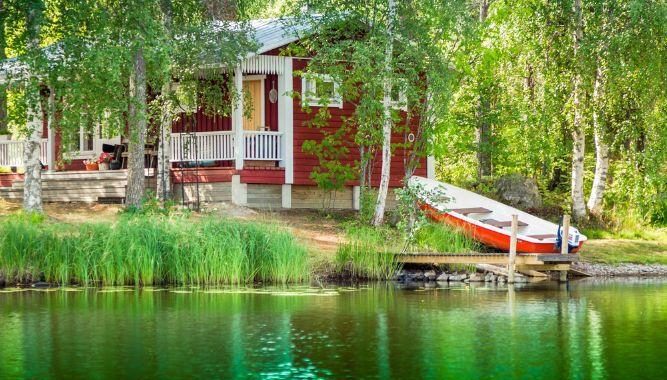
A Guide To Cottage Insurance
June 30, 2022
What makes a weekend at the cottage so special? For some, it’s the long days spent fishing on the docks. Others love the cozy nights spent huddled by a campfire or late mornings when you’re awoken by the sound of birds chirping.
All year long, you wait for cottage season. When the snow melts and the sun comes out, you can take off to the cabin and escape from the hustle and bustle of the city.
Insuring a cottage is a bit different than insuring a house. We’re going to answer a few common questions about cottage insurance:
What Is Cottage Insurance?
Also known as seasonal property insurance, cottage insurance offers coverage for your vacation home. It protects you against a range of common perils, including liability issues, structural damage, and fires.
The important distinction here is that a cottage is not your primary residence. Unlike your home, you don’t live at your cottage property year-round.
You might be wondering: Do I really need cottage insurance? Even though you spend less time at your family cottage than at your primary home, it’s still important to protect your property. Otherwise, you could be stuck paying out of pocket for damages and liability issues.
Don’t spend your summer worrying about what you might do if your property is damaged. With cottage insurance, you’ll enjoy peace of mind knowing that you’re covered.
Vacation Property Insurance Coverage
What will your cottage insurance cover? Your specific coverage will vary depending on your insurance provider. A standard policy includes the following basic coverage:
- Personal liability. If someone is injured on your property, they may decide to sue you for the damages. You can pay for medical expenses and legal fees with liability insurance.
- Cash value or replacement cost. Imagine if a fire took down your seasonal home. Would your insurance cover you for the actual cash value (which factors in depreciation) of your belongings/home or the replacement cost (which does not factor in depreciation)? Insurance that covers the replacement costs generally has higher premiums, but you can ensure you have enough coverage to replace what you lost.
- Personal belongings. Cover the replacement costs of your furniture, appliances, and other valuables.
To find out exactly what your policy includes coverage for, contact an insurance broker.
What Does Cottage Insurance Not Cover?
You may be wondering what kinds of claims won’t be covered by your insurance. This is a particularly important question to ask when buying insurance—you can determine whether you need additional coverage for certain risks.
Common exclusions include damage caused by sewer backups, frozen pipes, earthquakes, and animals. If you’re interested in more comprehensive coverage, get in touch with Nation West.
What Affects the Cost of Your Cottage Insurance Coverage?
The main factors that affect your insurance rate include:
- Location. What are the rates of flooding or vandalism in the area? How close is it to a fire station? Is it accessible by road, or do you need to boat to the property?
- Age of cottage. Older seasonal homes tend to be at a higher risk for insurance claims and cost more to insure.
- Whether you rent it. Renting out the cottage will give you a nice chunk of change, but it will also increase your insurance costs.
- Occupation. How frequently do you stay at your cottage? Do you go every other weekend or for the entire summer?
- Size. Bigger cottages cost more to insure.
- Replacement cost. The value of your home will also affect your insurance; it determines how much it will cost to repair or replace it.
- Security. If you have an alarm or security monitoring system, you can get a discount on your insurance.
- Construction. The type of plumbing, electrical systems, and building materials will also affect the likelihood of an insurance claim.
Renting Out Your Cottage
As a cottage owner, you know the costs of owning a second property can be taxing. Thinking of renting out your property for parts of the summer? Doing so can net you some extra profit, but it has implications for your insurance—specifically for your liability coverage and personal property.
If you plan to rent out your cottage, be sure to let your insurance company know. You may need to purchase a policy add-on. Otherwise, you might not be covered for a cottage insurance claim.
Depending on how much revenue you generate from your cottage, you may want to consider commercial insurance.
Primary or Secondary Property Insurance
As you get older, the idea of living in a rural area may be more appealing. If you’re thinking of moving to the cottage full-time, it’s important to update your cottage insurance policy.
If this is the case, the cottage will no longer be your secondary residence; it will become your primary residence and will need to be insured as such. Let your insurance company know if you plan on moving to your cabin full-time.
Ready To Buy Cottage Insurance?
There’s nothing quite like cottage season in Manitoba. Make sure you’re protected with the right cottage insurance policy.
Before you purchase cottage insurance, you want to make sure you’re getting the best rates for your coverage. You don’t want to spend your summer shopping for insurance. That’s why you need an insurance broker in Winnipeg.
At Nation West, we’re an industry-leading Canadian brokerage. We’ll help you find the right coverage for your property.
With our services, you can always expect a broad range of product offerings, excellent customer services, and competitive prices. Save money on your cottage insurance with Nation West. To get a personalized quote, contact us today!

